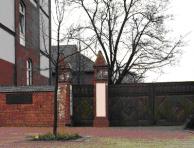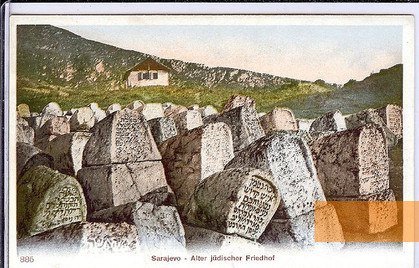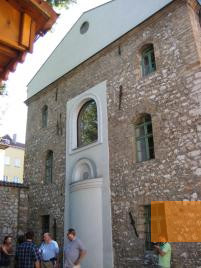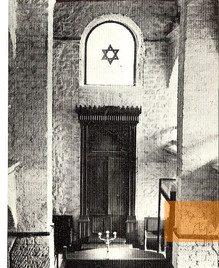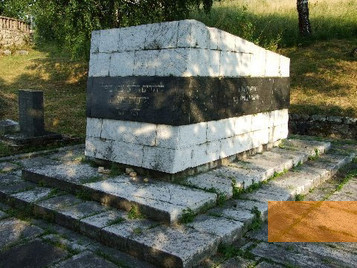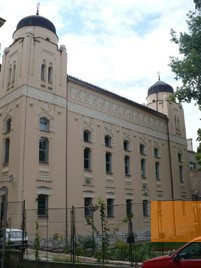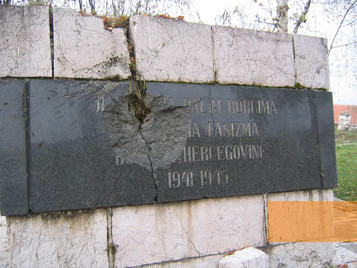A Jewish museum, located in the Old Synagogue of Sarajevo, has since 1966 commemorated the city’s Jewish community, whose establishment dates back to the 16th century. Beginning 1941, almost all of the Jewish residents of Sarajevo were deported to camps by the Ustaša; most of the deportees perished.
In 1941, there were between 8,000 and 12,000 Jews in the Bosnian capital of Sarajevo. Most of them were Sephardic Jews - descendants of Jews who had immigrated to Sarajevo from Spain in the 16th century. Later, Jews from German-speaking regions of Europe also settled in Sarajevo. The Sephardim established a number of Jewish institutions already in the 16th and 17th centuries, such as the Old Synagogue or the Jewish cemetery.
Following the German invasion of Yugoslavia in 1941, the country was dismembered: present-day Bosnia-Herzegovina was incorporated into the Independent State of Croatia (Croatian: Nezavisna Država Hrvatska, NDH), which was ruled by the fascist Ustaša movement. The Ustaša regime brutally persecuted its supposed enemies: Serbs, Jews and Roma were arrested by the Croatian authorities and deported to camps. The Old Synagogue in Sarajevo was severely damaged. Jewish men, women and children were deported from Sarajevo to Croatian concentration camps. Only about 1,500 Jews from Sarajevo survived the persecution under the Ustaša regime.
Following the German invasion of Yugoslavia in 1941, the country was dismembered: present-day Bosnia-Herzegovina was incorporated into the Independent State of Croatia (Croatian: Nezavisna Država Hrvatska, NDH), which was ruled by the fascist Ustaša movement. The Ustaša regime brutally persecuted its supposed enemies: Serbs, Jews and Roma were arrested by the Croatian authorities and deported to camps. The Old Synagogue in Sarajevo was severely damaged. Jewish men, women and children were deported from Sarajevo to Croatian concentration camps. Only about 1,500 Jews from Sarajevo survived the persecution under the Ustaša regime.
The exact number of victims can only be estimated. Between 6,800 and 10,200 Jews from Sarajevo were murdered or died of the inhumane conditions at the Ustaša-run camps. Many of the 1,500 survivors later emigrated to Israel.
After the war, the Old Synagogue was used as a house of worship by the small Sephardic community of Sarajevo up until the 1960s. In 1966, the city of Sarajevo established a Jewish museum in the building. The Sephardic community henceforth held their services at the Ashkenazi synagogue, incidentally one of the largest synagogues in Europe. During the Bosnian War in the 1990s, the Jewish museum was closed and used for storing artefacts from other museums in Sarajevo. The museum was eventually reopened, and since 2004, the building has once again been used by the Sephardic community of Sarajevo for services.
The old Sephardic cemetery of Sarajevo was established in the 17th century on the Trebević mountain. Located on the cemetery is a memorial to the victims of the Holocaust in Bosnia-Herzegovina. The cemetery has been devastated several times; most recently during the Bosnian War in the 1990s. The cemetery was cleared of mines in 1998 and later restored as far as possible.
The old Sephardic cemetery of Sarajevo was established in the 17th century on the Trebević mountain. Located on the cemetery is a memorial to the victims of the Holocaust in Bosnia-Herzegovina. The cemetery has been devastated several times; most recently during the Bosnian War in the 1990s. The cemetery was cleared of mines in 1998 and later restored as far as possible.
- Name
- Muzej Jevreja BiH
- Address
-
Velika avlija bb
71000 Sarajevo - Phone
- +387 33 475 740
- Fax
- +387 33 475 749
- Web
- http://www.muzejsarajeva.ba/
- info@muzejsarajeva.ba
- Open
- Monday to Friday 10 a.m. to 3 p.m.
Sunday 10 a.m. to 1 p.m.
